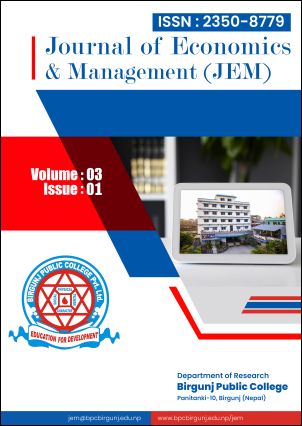A Study of Demographic Variables on Work Life Balance among Employees Working in Commercial Banks in Nepal
DOI:
https://doi.org/10.3126/jem.v3i1.59179Keywords:
Demographic factors, Work-life balance (WLB), Commercial Banks, Gender, Marital status, Job position, Work experience, Number of children, Family structureAbstract
Employees struggle to balance their personal and professional lives simultaneously in the current, rapidly expanding environment. The purpose of this study is to examine demographic factors and how they affect the work-life balance of people who work in Nepal's commercial banks. To select the sample from the various commercial banks, the study used a convenient sampling technique. Data were collected from 144 employees of Nepal's "A" class commercial banks. The 14-item scale served as a measurement for work-life balance. Using the application SPSS version 20, the results were tabulated and examined. Correlation analysis, independent sample t-tests, and one-way ANOVA were used as statistical analytical techniques to achieve the objective. According to the findings, married and unmarried employees have very different work-life balances. Additional significant differences in work-life balance were discovered when other demographic factors like the number of children and work history at the current job were taken into account. However, the results show that work-life balance is not significantly impacted by gender, job position, and family structures. Further study reveals that employees are more likely to feel satisfied at work than at home with the way their tasks and responsibilities are being managed.
Downloads
Downloads
Published
How to Cite
Issue
Section
License
Copyright (c) 2023 Birgunj Public College

This work is licensed under a Creative Commons Attribution-NonCommercial 4.0 International License.




